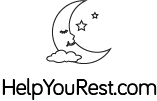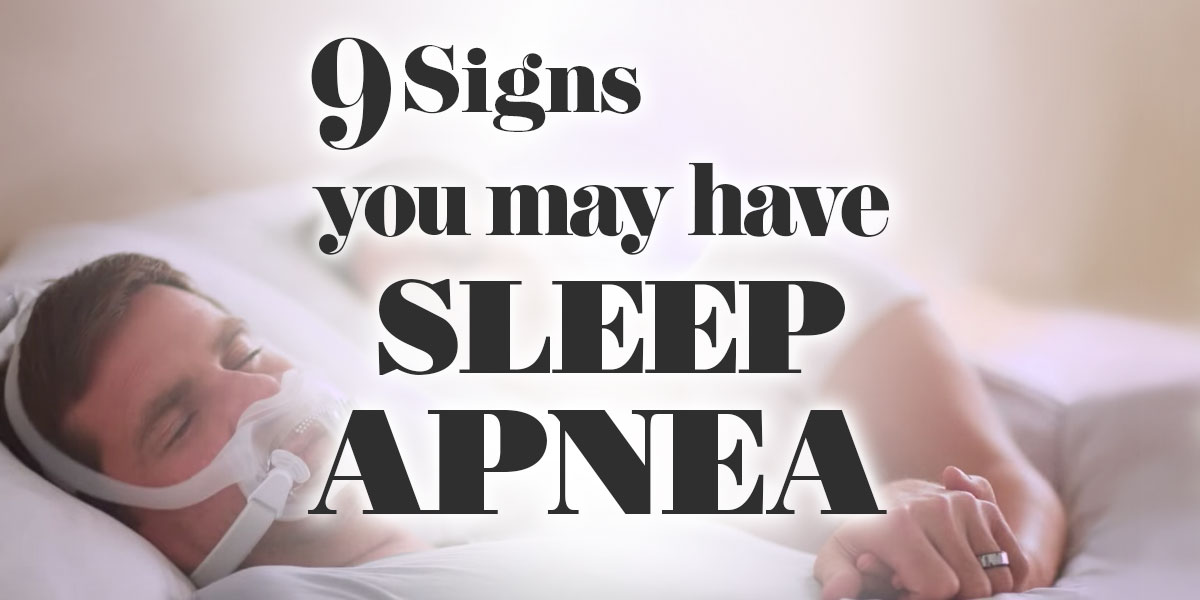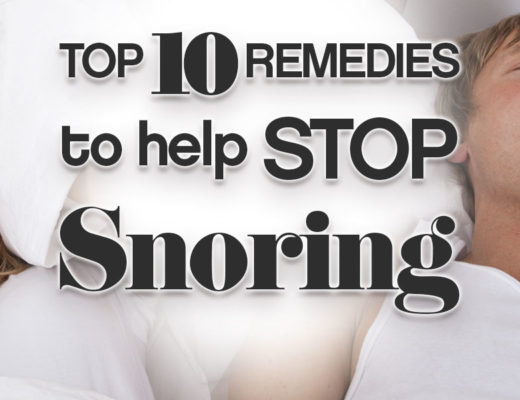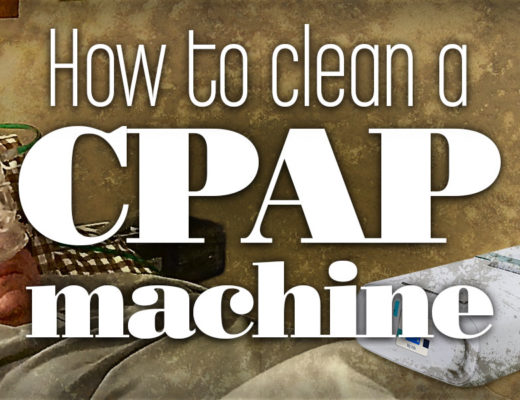Sleep apnea stands as one of the most common sleep problems people suffer around the world. In the United States alone, over 20 million people experience it.
What’s really scary, though, is that most people living with sleep apnea don’t even realize it—over three-quarters of cases in the US go undiagnosed because people fail to recognize the signs. Scarier still is that it and similar sleeping disorders can serve to worsen your health in other areas.
So what are the signs you might be living with sleep apnea? Before we can identify them, we need to understand what sleep apnea is. In a general sense, sleep apnea causes your breathing to stop and start while you’re sleeping. The medical community currently divides it into three distinct types:
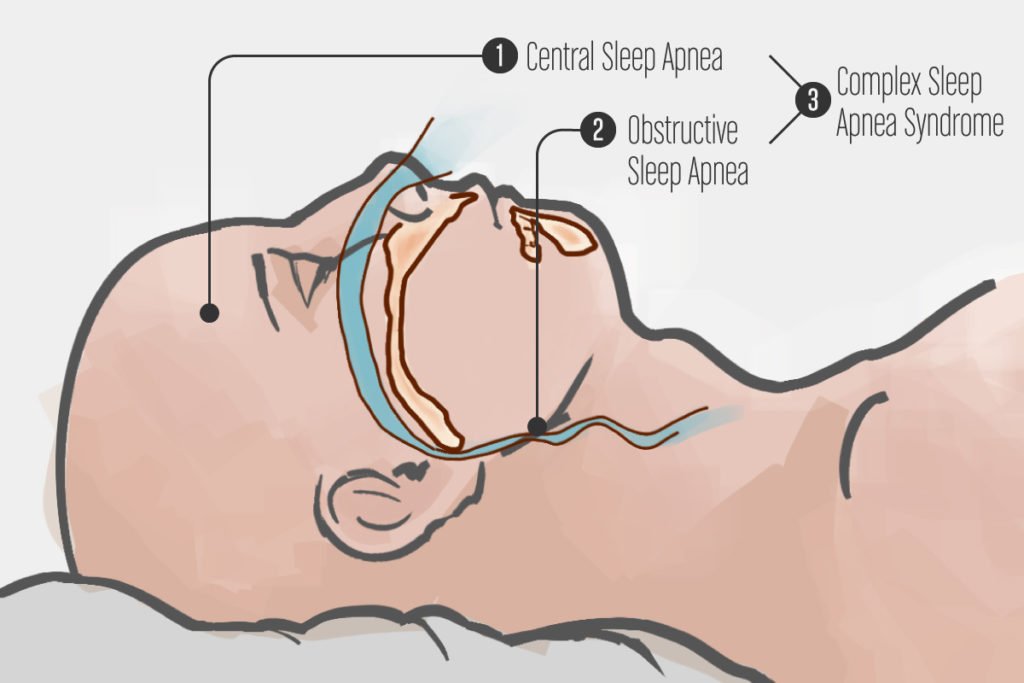
- obstructive sleep apnea, which happens when the muscles in your throat relax too much;
- central sleep apnea, when your brain misfires or briefly fails to send signals that help regulate breathing; and
- complex sleep apnea syndrome, which is seen in patients suffering from the other two types of apnea.
Sleep apnea is a serious concern that can affect anyone regardless of age or gender. Along with the risks outlined below, sleep apnea can increase your odds of getting type 2 diabetes, complicate your liver functions, and lead to metabolic syndrome, among other things. It can also interfere with your everyday medications as well as surgery. Addressing it early is the best way to protect yourself from these dire consequences.
With this understanding of what sleep apnea is, we have a stronger foundation for identifying potential signs of it. However, don’t use this article as a means to self-diagnose yourself. Rather, if you feel you have any of these symptoms, bring them up to your primary care provider. They’ll be able to accurately determine if you’re suffering from sleep apnea and can guide you along the path of treatment.
Chronic Snoring
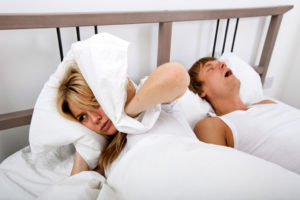 This is the most common symptom of sleep apnea and probably the easiest to recognize, whether we notice it ourselves or someone close to us does. Despite being one of the most common signs, many people tend not to think of it as being associated with a serious problem: snoring simply happens when they sleep. But there are much bigger issues at play.
This is the most common symptom of sleep apnea and probably the easiest to recognize, whether we notice it ourselves or someone close to us does. Despite being one of the most common signs, many people tend not to think of it as being associated with a serious problem: snoring simply happens when they sleep. But there are much bigger issues at play.
Snoring itself is the result of obstructed airways in the nose. A blockage, even if it’s partial, creates vibrations in those same airways, resulting in snoring. It’s a form of hindered breathing, and if it’s too severe apnea can occur.
With all of that established, snoring itself isn’t necessarily indicative of sleep apnea. There are a large number of reasons why someone snores that aren’t medical in nature and have no connection to a greater disorder. However, if you’re snoring loudly every night, that’s a strong indicator that the obstruction is serious. If it’s disruptive to your own sleep or someone else’s, that’s an even stronger sign.
Gasping for Air During Sleep
Much like snoring, this symptom is fairly common and can have numerous different underlying causes. However, under certain conditions, it can be linked to sleep apnea.
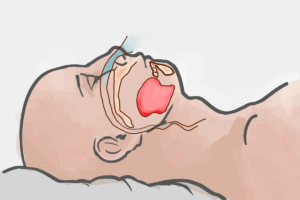 Complicating things further is that you may not even wake up when you suddenly gasp for air, which means it could be happening without you even knowing it. If you don’t have anyone else’s testimony to go by, your best way to check is to capture audio of yourself sleeping. Unlike chronic snoring, sudden gasping for air need not happen every night to fit the proper criteria.
Complicating things further is that you may not even wake up when you suddenly gasp for air, which means it could be happening without you even knowing it. If you don’t have anyone else’s testimony to go by, your best way to check is to capture audio of yourself sleeping. Unlike chronic snoring, sudden gasping for air need not happen every night to fit the proper criteria.
If you have woken up gasping for air previously, you probably remember the choking sensation and ensuing panic. If it is related to apnea, this is a result of stalled breathing. Taking sudden gasps, regardless of whether or not they wake you up, could be a sign that your obstructed breathing has become severe.
If you know that you take sudden and quick deep breaths while you’re sleeping, you should see your doctor right away. Even if it’s a minor issue like post nasal drip, it’s better to know for sure and eliminate other possibilities straight away.
You Feel Tired When You’re Awake Despite Getting Plenty of Rest
If you get between 7 and 9 hours of sleep a night but still feel exhausted the next day, that could be the result of sleep apnea. The sluggishness you feel could stem from waking up throughout the night thanks to poor breathing caused by apnea. The technical term for this is excessive daytime sleepiness or EDS.
 Other factors need to be identified to correctly diagnose EDS. Besides feeling tired through daylight hours, you’ll experience low levels of energy, inability to concentrate, inability to stay awake (or feeling the need to rest multiple times during the day), and struggling to wake-up in the morning. Usually, you’ll experience many of these at once because they are all linked to exhaustion.
Other factors need to be identified to correctly diagnose EDS. Besides feeling tired through daylight hours, you’ll experience low levels of energy, inability to concentrate, inability to stay awake (or feeling the need to rest multiple times during the day), and struggling to wake-up in the morning. Usually, you’ll experience many of these at once because they are all linked to exhaustion.
Sleep apnea negatively impacts the quality of your sleep; the poor airflow prevents you from reaching the deeper, more restorative stages of sleep, and the time you spend waking up and falling back asleep chips away at this even further. Because of this, you may be in bed for eight hours but not really being asleep for most of that time.
You Experience Chronic Headaches Every Day
Another seemingly vague symptom that can be easily dismissed if you don’t know what to look for is headaches. Sleep studies have been conducted seeking to connect headaches to sleep apnea, as those diagnosed with the disorder commonly report headaches. However, while there’s a lot of interesting evidence to suggest a connection, it’s not entirely conclusive yet. Still, many doctors dealing with sleep apnea will ask about headaches when looking to make a diagnosis.

It’s been suggested that the link between headaches and sleep apnea may be an ailment known as chronic daily headaches, also known as CDH. Studies of those with CDH found they had a small group of conditions in common, one of which was sleep apnea. This appears to make sense, given that insufficient oxygen can cause headaches, and the poor breathing caused by sleep apnea leaves you getting low levels of oxygen. Other conditions that also overlap with sleep apnea symptoms.
Those studied experienced headaches while waking up and for a short time afterward. The pain they felt was described as being like a migraine, too. It eventually fades as you go about your day and you begin breathing regular levels of oxygen. However, in order to be CDH, it needs to happen almost every day.
You Experience Extreme Mood Swings
 When you’re unable to sleep well, it doesn’t take long for your mental well-being to suffer. Not only will you experience low energy throughout the day, but your mood will hit extremes, particularly on the low end of the scale. You’ll be noticeably more irritable, anxious, and depressed. This isn’t the same as bipolar disorder, as is often described.
When you’re unable to sleep well, it doesn’t take long for your mental well-being to suffer. Not only will you experience low energy throughout the day, but your mood will hit extremes, particularly on the low end of the scale. You’ll be noticeably more irritable, anxious, and depressed. This isn’t the same as bipolar disorder, as is often described.
Mood swings as a symptom of sleep apnea are particularly dangerous for two reasons. First, it’s easy to look at your mood in isolation and not connect it to other issues like sleep apnea. That means that when you go to treat it, you won’t be addressing the real problem. Second, if left unaddressed, these changes can evolve into full-blown disorders of their own, complicating matters significantly.
This may be among the easiest of symptoms for you to detect on your own: if you can reflect on your behavior throughout the day and recognize any unusual extremes, you should take note of them. If they become ongoing, discuss them with your doctor.
You Are Obese or Overweight
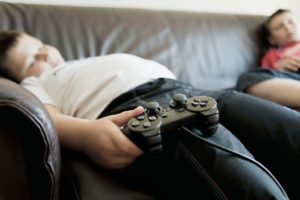 With the number of overweight Americans on a steady rise, health campaigns have made it well known that excess fat is an open door to a slew of health problems, so it shouldn’t be a surprise that sleep apnea is among them. Medical studies have shown that sleep apnea is more common among those who are clinically obese than those who aren’t. Moreover, some symptoms of sleep apnea are also complications that can arise from obesity.
With the number of overweight Americans on a steady rise, health campaigns have made it well known that excess fat is an open door to a slew of health problems, so it shouldn’t be a surprise that sleep apnea is among them. Medical studies have shown that sleep apnea is more common among those who are clinically obese than those who aren’t. Moreover, some symptoms of sleep apnea are also complications that can arise from obesity.
When your body gains fat, you don’t have any control over where it actually appears. The idea that certain foods build or reduce fat in specific areas of the body is an old myth. So, if your body decides to store fat in the tissues of your throat, breathing can become more difficult. Hence the development of sleep apnea. Snoring is common among those who are obese for the same reason.
You can actually measure the circumference of your neck yourself to see the likelihood of your weight possibly causing sleep apnea. Present guidelines state that women who are at least 16 inches around the neck and men who are 17 around are at a high risk of developing sleep apnea if they don’t have it already.
You Suffer from Insomnia
 Sleep insomnia isn’t as simple as often depicted. Though we tend to think of it as a complete inability to fall asleep, it actually comes in different forms. One makes it difficult to initially fall asleep, minimizing the amount of time we spend in restorative sleep phases. Another forces us awake while making it difficult or impossible to fall back asleep.
Sleep insomnia isn’t as simple as often depicted. Though we tend to think of it as a complete inability to fall asleep, it actually comes in different forms. One makes it difficult to initially fall asleep, minimizing the amount of time we spend in restorative sleep phases. Another forces us awake while making it difficult or impossible to fall back asleep.
How insomnia relates to sleep apnea isn’t entirely clear, but there are a few possibilities. The shallow breathing of sleep apnea can startle you awake, disrupting your rest. Even if you return to sleep quickly, the time you have to spend waiting to reach the later, restorative stages of the sleep cycle means you’re getting less rest. This can, over time, cause insomnia.
Another suggestion ties insomnia and sleep apnea’s relationship into anxiety. When your airflow becomes too restricted, it can feel like you’re choking, and your brain panics as it forces you to wake up. If this comes accompanied by a sense of fear, confusion, and/or foreboding, it can be even harder to fall back asleep, and thus the seeds of insomnia are planted.
Making a diagnosis of sleep apnea off of insomnia alone is tricky. Doctors often diagnose insomnia on what a patient reports rather than through direct study. If you are mistaken in believing that you have insomnia, you may be misdiagnosed.
You Have High Blood Pressure
Sleep apnea can cause you to stop breathing as many as thirty times an hour during sleep. This directly lowers the level of oxygen in your blood, causing your circulatory system to work harder to do its usual work. When you suddenly wake up, as you often do with sleep apnea, your blood pressure spikes sharply.
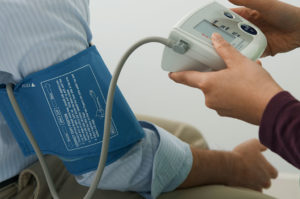 The same thing happens when you’re unexpectedly awoken by another source, such as sudden noise or being shaken. Your heart rate rises at the same time, parallel to your blood pressure. However, sleep apnea can cause your blood pressure to rise and fall in close succession, putting undue stress on your heart, central nervous system, and circulatory system all at once, creating a new series of medical problems.
The same thing happens when you’re unexpectedly awoken by another source, such as sudden noise or being shaken. Your heart rate rises at the same time, parallel to your blood pressure. However, sleep apnea can cause your blood pressure to rise and fall in close succession, putting undue stress on your heart, central nervous system, and circulatory system all at once, creating a new series of medical problems.
Those with sleep apnea may experience not only higher than normal levels of blood pressure throughout the day but increased levels of adrenaline as well. This, in turn, can contribute to mood swings.
Waking Up With A Sore Throat
When you suffer an apnea in your sleep, the juices in your stomach—which includes bile, acid, and other less than pleasant things—are often sucked up into your throat. When you wake up, what’s left behind irritates and inflames your throat. It can cause it to feel sore and tender, or leave it dry and parched.
A handful of habits actually make this worse. Sleeping on your back (which also promotes snoring), allows your tongue to fall back, cutting off airflow. Having a meal or consuming dairy close to your bedtime gets the body to produce more juice in your stomach. The frequency of sleep apnea can cause this irritation to grow into long-term pain.
If you live with any of these symptoms and experience them multiple times throughout the week. It’s time to talk to your doctor about them and mention the possibility of sleep apnea. The longer you wait, the more damage it may be causing you, so don’t delay seeking a diagnosis.
Some other useful posts
Best Mouthguards for Sleep Apnea and Snoring
